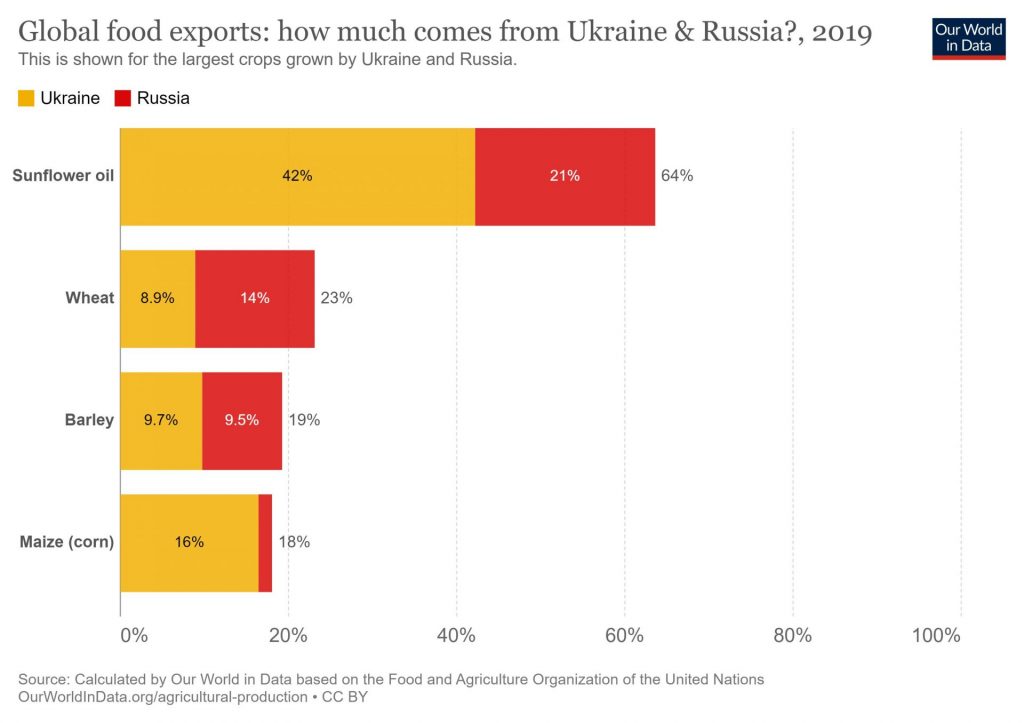
Por Marina Ariboni e Nicole Bonafé
Com o atual mundo globalizado, os conflitos armados entre Estados podem trazer repercussões econômicas diretas em outros países, mesmo esses não possuindo relações políticas, econômicas ou comerciais algumas com os demais em conflito. Sob esse viés, observa-se a atual guerra entre a Rússia e a Ucrânia, em uma perspectiva de que esses países, principalmente a Rússia, são importantes agentes dentro do mercado internacional, com expressivos fluxos de exportação e importação. No caso do Brasil, por exemplo, a parceria é bem intensa, pois a Rússia é o sexto país de quem o Brasil mais compra produtos, sendo os mais comuns, trigo, milho e fertilizantes, que representava em 2021, US $5,7 bilhões em importações (segundo Ministério da Indústria, Comércio Exterior e Serviços). Tendo isso em vista, por mais que grande parte dos setores ao redor do mundo estão sendo afetados devido á guerra, os que mais foram impactados foi o de logística e transporte, que serão destrinchados nos parágrafos a seguir.
A priori, desde o início da guerra, os países ao redor do globo já começaram a sentir os impactos dos altos preços do combustível e do gás, o que automaticamente provocou a elevação dos custos logísticos no mundo todo. Além disso, houve a interrupção do fornecimento de fertilizantes, no qual a Rússia é a maior produtora do mundo, e grãos, como o trigo (Rússia e Ucrânia são, respectivamente, a primeira e a quarta maiores produtoras de trigo do mundo), a cevada e o milho, o que faz com que ocorra um aumento dos preços e dos alimentos no cenário internacional.
Ademais, com as diversas sanções aplicadas à Rússia, tanto as importações quanto as exportações foram diretamente comprometidas. Nesse sentido, muitos embarques e voos russos acabaram sendo suspensos, e uma grande quantidade de produtos com destino à Rússia precisaram ser cancelados também. Porém, a verdade é que não se sabe até quando a guerra vai durar, por isso já existem diversos especialistas traçando planos de ação. Dessa maneira, para os profissionais de logística, devem ser buscadas alternativas e, uma das ideias seria procurar novos parceiros comerciais e buscar em outros países o suprimento de suas necessidades de caráter nacional. Além disso, a outra opção seria buscar soluções regionais, isto é, foco na produção interna nacional e, para que cada vez menos ocorra uma dependência econômica da Rússia e da Ucrânia para a formação de negócios.
Em suma, entendendo que conflitos são feitores de problemas internos para quase todas as áreas dentro de um Estado, é necessário que os países, que não estão em conflito e são dependentes em alguma área daqueles que estão, tenham outras alternativas a seguir para não prejudicarem, em larga escala, sua população, tendo em vista que a prioridade de um Estado deve ser a segurança de seu povo, levando em consideração o acesso aos itens básicos, e a proteção contra esses conflitos
Portanto, o conflito citado anteriormente, que vem afetando a Europa, e o mundo todo, desde fevereiro de 2022, está servindo como exemplo de como os Estados são interdependentes, e necessitam de uma política de “boa vizinhança” para que todos consigam sobreviver, e fazer com que sua população não fique desamparada repentinamente.
Referências
BEMPARANA. Guerra entre Rússia e Ucrânia impacta logística internacional. Disponível em: https://www.bemparana.com.br/noticias/economia/guerra-entre-russia-e-ucrania-impacta-logistica-internacional-273629/. Acesso em: 16 set. 2022.
E-COMMERCEBRASIL. O IMPACTO DO CONFLITO NA UCRÂNIA NAS CADEIAS DE LOGÍSTICA E TRANSPORTE. Disponível em: https://www.ecommercebrasil.com.br/artigos/conflito-ucrania-logistica-transporte. Acesso em: 16 set. 2022.
ITRANSPORTE. Guerra entre Rússia e Ucrânia: quais são os impactos logísticos?. Disponível em: https://itransport.com.br/guerra-russia-e-ucrania-e-impactos-logisticos/. Acesso em: 16 set. 2022.
UNINTER. Os impactos da invasão da Ucrânia sobre a logística internacional. Disponível em: https://www.uninter.com/noticias/os-impactos-da-invasao-da-ucrania-sobre-a-logistica-internacional. Acesso em: 16 set. 2022.
